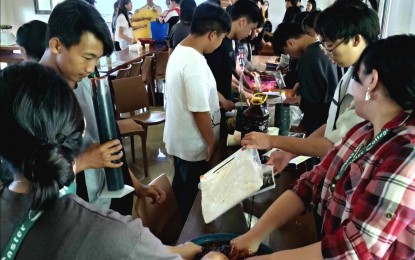
ORGANIC FERTILIZER. Grade 11 Science, Technology, Engineering and Math students of Easter College prepare organic fertilizer using vegetables and molasses during the “Training on Urban Gardening for a Food Secure Community” at the Department of Agriculture conference hall in Guisad, Baguio City on Friday (April 26, 2024). The training is aligned with DA’s thrust of encouraging public participation in food production through urban gardening. (PNA photo by Liza T. Agoot)
BAGUIO CITY – At the height of the Covid-19 pandemic that started early 2020, residents here and in other urban areas did not experience lack of food after flower gardens were turned into plots with edible plants.
The city is continuing the initiative by training the youth to go into urban gardening.
Dr. Aida Pagtan, chief of the Regional Agriculture and Fisheries Information Service of the Department of Agriculture-Cordillera Administrative Region (DA-CAR), said among the trainings involved 30 Grade 11 Science, Technology, Engineering and Mathematics students of Easter College in Baguio City on Friday.
The students and 15 teachers joined the “Training on Urban Gardening for a Food Secure Community” being conducted by the DA-Bureau of Plant and Industry (BPI) and the Cordillera chapter of the Philippine Association of Agriculturists (PAA).
Pagtan, a licensed agriculturist and the vice president of the PAA-Cordillera, said it is important for young people to get involved in food production.
“The average age of farmers is 57. This is what the DA is addressing for coming up with programs that will encourage youth involvement in any facet of agriculture,” she said in an interview.
She also mentioned the Young Farmers Challenge, a program that will encourage the youth to get involved in agriculture without necessarily tilling the soil but helping boost planting and production by joining other parts of the process.
Out of the 30 participants in the training, at least five have expressed interest in taking up a course in agriculture.
“While taking up agriculture courses will also help, ordinary people, the young people growing minimal amount of food in their backyard will spell the difference in food production,” Pagtan said.
She herself maintains a vegetable garden in their family compound in La Trinidad, Benguet.
She said they save an average of PHP5,000 monthly on food expenses.
“I believe in urban gardening, whether it is urban or peri-urban, that is why I adopt the same in my work and my associations. We can help sustain food by assuring that we have food on our table coming from our gardens,” she added.
Divina Jose, training coordinator at the BPI-CAR, said Cordillera transports 80 percent of its vegetables to other regions.
Helping grow food will ensure that families in the region will not run out of food, especially in Baguio, a highly urbanized city with small and limited areas for food production, she told the trainees.
“Urban agriculture is important for us for our nutrition and to address overweight, malnourishment and obesity,” she said.
Gerardo Banawa, DA-CAR’s coordinator for the corn program and PAA-CAR president, said they will expand partnerships with the schools to encourage young people to practice urban gardening and help sustain food supply.
Simple way to grow food
“The activity did not only focus on knowledge but experience, which we can do in our homes and we can do for environmental protection,” Shenandoah Wanawan, 17, said.
Martha Lindsey Mango, 17, also said she was surprised to know that urban gardening is simple.
“Now I understand why my grandmother gets angry when we just throw kitchen leftovers,” she said.
She said that with the training, her love for planting might go a long way.
Jameson Bayan, one of the teachers who joined the training, said they give students at least 80 hours of immersion in their General Biology subject so they can experience real-life situations. (PNA)
